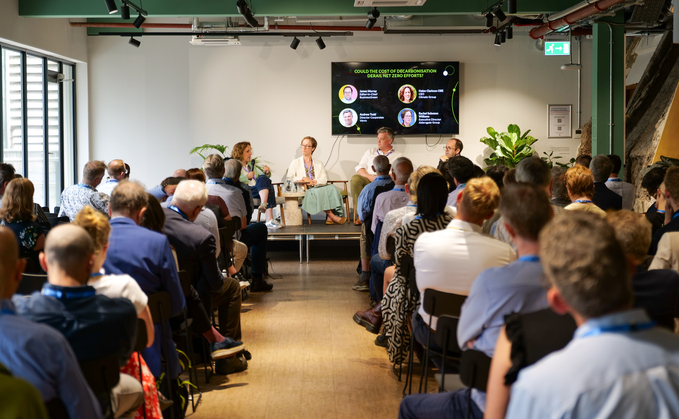
Latest BusinessGreen event sees experts explore how shifting the focus of arguments in support of sustainability can help overcome cost barriers to climate action
A focus on 'resilience' and an ability to access increasingly granular data to demonstrate returns on investment can play a key role in helping businesses overcome the cost barriers that are threatening to derail corporate decarbonisation efforts.
That was the message from leading green economy experts speaking at the latest BusinessGreen and Sustainable Ventures 'Evening With' event earlier this week, which was hosted in partnership with sustainability consultancy Verco. The event at Sustainable Ventures' London climate tech hub brought together green business leaders to explore how cost challenges are hampering the adoption of energy and carbon-saving innovations, with experts sharing advice on overcoming the financial barriers and cost-saving blind spots companies face as they embark on the next phase of their net zero strategies.
Andrew Todd, director for corporates at Verco, argued that framing the business cases for climate action around the potential to enhance energy security and mitigate climate risks can sometimes prove more fruitful than fixating on sustainability benefits. "A good way to start to address this problem is to talk in terms of risk," he said. "I think businesses are much more comfortable, they understand risk, and they understand how to manage risk."
His comments were echoed by Aldersgate Group executive director, Rachel Solomon Williams, who urged business leaders making the business case for decarbonisation to refocus their efforts on the "triple meaning" of sustainability, rather than focusing exclusively on the environment. "It's important to remember what sustainability really means," she said. "It means something is sustainable in a practical, economic, and also an environmental sense. But we've lost that. We should be thinking about business sustainability, and that includes resilience."
The panel noted that corporate backing for sustainability strategies remained encouragingly robust, despite plenty of 'noises off' from those politicians opposed to climate action. Sarah Mukherjee, CEO at the Institute of Sustainability and Environmental Professionals (ISEP) - formerly known as IEMA - pointed to new research from the group releases this week which found around half of environmental and sustainability professionals say their budgets have increased over the past year, with fewer than two per cent experiencing cuts in 2024.
However, Solomon Williams warned that the given the bulk of "low hanging fruit" initiatives for cutting emissions have already been planned or put in place, sustainability professionals now face the looming challenge of making the business case for more costly projects that are likely to involve more technology risk and longer payback periods.
Dave Worthington, Verco's managing director, argued it was still possible to make a compelling business case for more ambitious decarbonisation projects, as part of a wider net zero strategy. He highlighted how there was a first mover advantage to energy-saving projects that can cut costs, as cumulative savings can stack up before competitors have made similar moves. He also stressed how increasingly sophisticated software that can track energy use, costs, and emissions could provide a "magic bullet" that demonstrates how promised savings over time are really delivered.
His comments were echoed by Inder Poonaji, director of sustainability and ESG at Modulaire, who stressed the importance of having "great data" to drive investment. "The last thing the investor wants is to see the data we're giving is rubbish," he said, as he explained how the conditions for the company's €3bn ESG bonds meant the firm was regularly audited to demonstrate it was making clear progress against its sustainability targets.
Poonaji added that strong internal governance was likewise a core component of the business case for successful decarbonisation projects. "If you don't have strong governance, you can forget anything else," he said. "Businesses move up and down. When things are hard, you've got to know the three or four priorities which you've got to stick to. I think trying to be everything is a bit of a mistake."
The combination of a focus on resilience, robust and reliable data, and strong governance processes increases the chances of board-level support for decarbonisation projects, which all the speakers agreed was critical to the success of corporate sustainability efforts. "Getting CEO support is probably the best step," said Worthington. "All of the examples where we've had successful programmes have had CEO commitment behind them."
However, Mukherjee stressed that top level support had to be accompanied by investment in sustainability skills and training right across an organisation, adding that tackling green economy skills shortages will be key to driving down the cost of decarbonisation. "If you don't have the skills and you don't have the people, you can't make the money," she said.
Relatedly, Solomon Williams argued that "more creative and make radical collaboration" between businesses and throughout supply chains had a key role to play in unlocking clean tech innovation and reducing the cost of decarbonisation projects. By working together, even at times with competitors, businesses can share best practices, maximise economies of scale, and curb the cost of finance, all of which can serve to reduce the upfront costs associated with clean tech deployments and other carbon-saving projects.
The adoption of these various best practices can go a long way towards reducing the upfront costs associated with green projects, in the process strengthening the business case for climate action and demonstrating that attractive returns on investment. As such, they go a long way to explaining how leading businesses are continuing to ramp up investment in sustainability, creating a widening gap between the leaders that are driving down emissions and operational costs and the laggards that remain wedded to environmentally damaging business models.
It is a disconnect that begs the question as to how more businesses can be encouraged to adopt sustainability best practices and ramp up investment in clean technologies, despite various economic headwinds. The speakers were in broad agreement that it is here that more effective policy interventions are required.
Helen Clarkson, CEO at the Climate Group, argued external factors such as greater "policy certainty" could strengthen corporate climate plans further, help de-risk clean tech investments, and make the costs of decarbonisation easier to justify. As such, she acknowledged the perceived political backlash against environmental, social, and governance efforts had the potential to undermine such certainty and push up the cost of capital - a fear that was amply demonstrated by Reform this week through its threat to try and unpick future clean power contract auctions.
Solomon Williams concurred that while mandates and targets "work", it is only through the hard wiring and entrenching of effective policies that businesses and investors can be provided with the certainty they need to justify projects that can have long payback periods. "The UK has been incredibly bad at that for as long as I can remember, but I think this government does get it, and they're trying to do that," she added.
Get the policies right - and there was broad agreement on the urgent need to bring down the cost of electricity to help enable investment in electrification - and it becomes a lot easier to make the business case for investment in a wide range of clean technologies, including some of those early stage projects that will be required in hard to abate sectors.
But several panellists also stressed that even without perfect policies in place, there are lots of proven technologies now available that can drive down emissions and costs, while enhancing competitiveness and reducing climate risks. Upfront cost barriers remain, but with the right data, the right finance packages, the right governance, and the right arguments, a compelling business case can still be presented for carbon-cutting projects that will have to be delivered sooner or later if net zero goals are to be met.
Keep up to date with all the latest green business news by signing up to the free Daily and Weekly BusinessGreen Newsletters.








